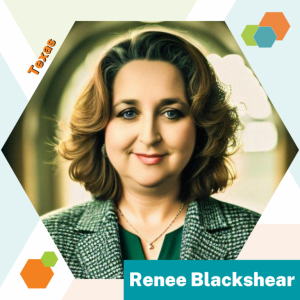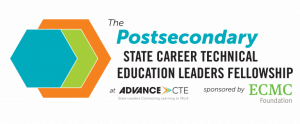In September 2024, Advance CTE and ECMC Foundation announced the third cohort of The Postsecondary State Career Technical Education Leaders Fellowship at Advance CTE—Sponsored by ECMC Foundation (Fellowship). The Advance CTE — ECMCF Fellows are representative of multiple demographic categories, reflecting the Fellowship’s goal of intentionally building a postsecondary leadership pipeline for underserved populations in Career Technical Education (CTE) that closes racial representation gaps and removes equity barriers to postsecondary leadership advancement.

This blog is a part of the Fellow Feature series, highlighting the journeys and insights of leaders in the Fellowship. In this blog, Senior Policy Associate Vania Iscandari interviewed Fellow Renee Blackshear, senior instructional technologist/ workforce trainer and esteemed professor at Texas State Technical College.
Q: Let’s start with your journey into CTE. How did your background shape your path into this field?
A: Growing up, my family faced financial challenges, which made me acutely aware of the need for stable, well-paying jobs. For a while, I dreamt of becoming a journalist, but I quickly realized that CTE offered real, hands-on opportunities to build a sustainable career. What drew me to CTE wasn’t just financial stability; it was the chance to provide others, especially those from underserved communities, with the skills they need to succeed in today’s job market.
Q: You’ve also mentioned that your Native American heritage has influenced how you view success. Can you share how that shapes your perspective?
A: Absolutely. My heritage has taught me resilience. Growing up, I learned to adapt and persevere through challenges, something that’s deeply embedded in Native communities. That resilience has shaped how I approach my work in CTE, specifically in creating opportunities for people to gain the skills they need to take control of their futures. I want to help others find their strength through education and training, just as my heritage has helped me find mine.
Q: You’ve been vocal about the need to promote digital transformation, especially for underrepresented groups like Latinx females. Why do you think this is such a crucial issue?
A: The digital transformation is happening quickly, but underrepresented groups, especially Latinx women, are often left out of these opportunities. According to a research report by Accenture titled “Resetting Tech Culture,” 27% of computing roles in the U.S. market are held by women, and just 3% and 2% are held by African-American and Hispanic-American/Latina women, respectively. It’s critical that we raise awareness about these opportunities and create inclusive programs that specifically target these groups. Mentorship, access to technology, and creating pathways into tech are key steps in ensuring that more women, especially from marginalized communities, can break into these industries.
Q: You’ve talked about the importance of building relationships. How has collaboration shaped your approach to equity and workforce development?
A: Collaboration has been key in my journey. It’s not enough to know what needs to change—we have to work together to make that change happen. Building relationships between educators, employers, and community organizations is essential for creating an equitable workforce development system. For me, looking at systems through the lens of equity has been a personal growth process. I’ve learned that real change happens when we recognize and dismantle the barriers that exclude certain groups from success.
Q: You’ve also mentioned creating a “playbook” to bring more women into skilled trades. What does that idea look like?
A: Yes, I’m really excited about this concept. Skills-based work has traditionally been male-dominated, but there’s so much potential for women to thrive in these fields. According to a 2021 survey and report from the Institute for Women’s Policy and Research, women remain highly underrepresented in the trades, accounting for just 4% of all workers in construction occupations. The playbook would be a practical guide that helps organizations bring more women into the trades—through outreach, training, and retention strategies. It would provide resources, share success stories of women in trades, and offer actionable steps to create inclusive environments. The goal is to show that these industries are a viable and rewarding career path for women.
Q: There’s often a disconnect between education and industry. How can we better align the two to prepare learners for the workforce?
A: The key to better workforce preparation is collaboration. Industry professionals need to be actively involved in shaping educational curriculums so that learners are aligned with the skills employers are seeking. But it’s not just about the curriculum. It’s also about building relationships between educators and industry leaders. Also, by engaging with learners directly, employers can help guide them toward specific career paths and give them a better understanding of what skills they need to succeed.
Q: You’re clearly passionate about creating long-term change. What advice would you give to others who want to make a difference in CTE or workforce development?
A: My advice is simple: never stop pushing for change. The systems we’re working with today weren’t designed to be equitable or inclusive, but that doesn’t mean we can’t improve them. CTE has the power to transform lives, and we must continue innovating to ensure that everyone—especially underserved communities—has access to the skills and opportunities that will lead to success. Don’t be afraid to challenge the status quo. Real solutions often come from looking at problems in a new way.
Q: As a participant in Advance CTE’s national Fellowship, what do you hope to gain from this experience?
A: Being a part of the Fellowship is such an incredible opportunity. I hope to gain a deeper understanding of how to implement systemic change at both the state and national levels. The Fellowship provides a platform for collaboration, and I’m excited to connect with other leaders who share a passion for transforming CTE. I also want to learn more about how to scale the innovative practices and policies that we’re exploring in the Fellowship in order to have a broader, lasting impact. Above all, I hope to take back to my institution practical strategies and insights that will help me advocate for more inclusive and effective workforce development systems.

As Renee underscored, the urgency of transforming workforce development and education to ensure equal access to opportunities for all is of utmost importance. From increasing diversity to bridging the gap between education and industry, the path forward is clearly built on collaboration, inclusion, and continuous innovation, concepts key to shaping the future of CTE and workforce development. Discover more about Renee and the other Fellows driving transformation in the third cohort of the national Fellowship on the Advance CTE website.
